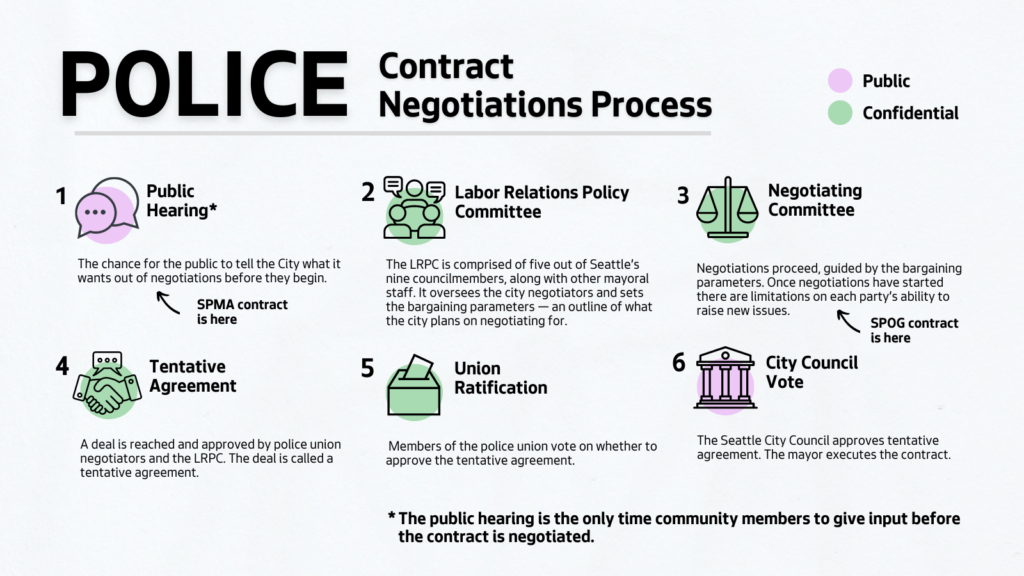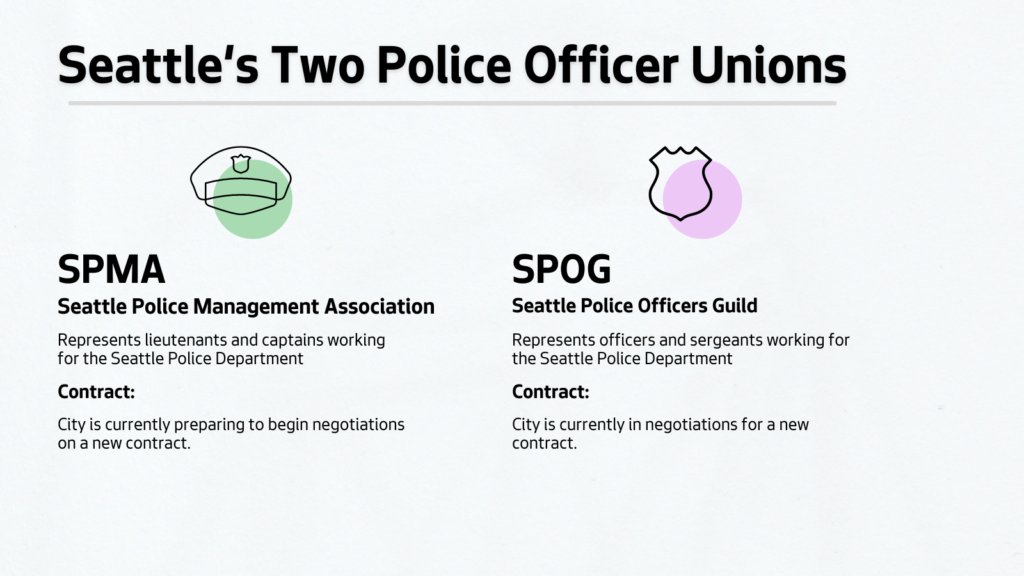The Seattle City Council will be holding a public hearing to gather community input on the upcoming Seattle Police Management Association (SPMA) contract negotiations. It will be on August 8 at 5:30 pm inside Council Chambers at Seattle City Hall.
It’s a crucial moment, as it will be the public’s only opportunity to give input before the contract is negotiated. The hearing will take place during a special meeting of the Council’s Select Labor Committee and Public Safety and Human Services Committee.

The City of Seattle agreed to an updated contract with SPMA last year. Among other things, it created a new Discipline Review System. That new system, which sets the rules for how police managers can appeal cases in which they have been found to have violated policy, addressed many of the shortcomings found in the previous, traditional arbitration system.
That agreement is only scheduled to last through the end of this year. Contract negotiations will get underway in coming months. Under city law, a hearing must be held at least 90 days before negotiations begin. The current contract will remain in place until negotiations are complete.
What are Seattle’s two police officer unions?

Seattle has two different union who represent police officers. The Seattle Police Management Association (SPMA) represents lieutenants and captains, while the Seattle Police Officers Guild (SPOG) represents officers and sergeants.
What are police contracts
Seattle’s police contracts are the result of negotiations between Seattle’s police unions and the City. Among other things, they establish how much police officers are paid, what benefits they receive, and how police officers can be held accountable when they violate policy.
Importantly, both SPMA and SPOG negotiate their contracts independent of one another. That means SPOG officers and SPMA officers work under different police accountability rules.
How police contracts affect police accountability
In Washington State, police contracts do more than establish what wages and benefits officers receive – they can limit how the City can hold police officers accountable when they violate police department policies. Police contracts can limit how police officers are investigated, make it harder to determine if officers have violated policy and ultimately hold them accountable.
Who negotiates police contracts?
City leaders, including five of Seattle’s nine councilmembers, oversee the negotiations through the Labor Relations Policy Committee (LRPC). Following a public hearing, the LRPC will establish its priorities or ‘bargaining parameters.’ Once parameters are set, negotiations with the union begin. Once negotiations have started there are limitations on each party’s ability to raise new issues. Generally, no new issues can be raised, unless approved by the union.
As of the current SPOG and the last SPMA negotiations, Seattle’s civilian-led police accountability agencies participate in the LRPC parameter setting process and serve as technical advisors to LRPC members. The Office of Police Accountability, Office of Inspector General, and an appointed Community Police Commission representative all have access to the confidential process to advise on police accountability issues.
In negotiations, the City is represented by the Negotiating Committee. That includes representatives from the Executive’s staff and a Seattle City Council Central Staff member. The Negotiating Committee meets with union representatives and reports back to the LRPC.
When a deal is reached and confidentially approved by both the LRPC and union’s negotiators, the deal is called a “tentative agreement.” The police union’s members then vote on the deal. If the union approved, the City Council approves the contract.
If the Council then votes against the tentative agreement after members approved of it in the LRPC, the City could risk drawing an Unfair Labor Practice complaint from the police union and be subject to sanctions.
What happens if no deal is reached?
Unlike many other employees, police cannot legally go on strike due to the nature of their jobs. Instead, if a police union and the City can’t reach a deal, the negotiations can go to interest arbitration. In that process a neutral arbitrator would make binding decisions to resolve disagreements about the contract. That process is governed by RCW 41.56, specifically RCW 41.56.430 through RCW 41.56.490.

